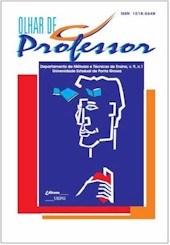O detalhe e o macro-contexto: o uso da teoria centrada no Estado para explicar práticas e políticas educacionais
Conteúdo do artigo principal
Resumo
Neste artigo, por meio da teoria centrada no estado, procura-se compreender mudanças ocorridas recentemente em escolas inglesas. Para tanto, consideram-se as preocupações expressas por Jenny Ozga, a qual afirma que muitas pesquisas sobre política e prática educacional ignoram o macro-contexto. Com base em dados de estudos de caso, argumenta-se que teorizações sobre as políticas educacionais que se fundamentam em concepções centradas no Estado oferecem pouca ajuda na compreensão do que acontece nas escolas. Sugere-se que, ao invés de denegrir o ‘empiricismo’ das pesquisas, dever-se-ia reconsiderar a utilidade dos referenciais macro-analíticos. Defende-se a idéia de que tais referenciais podem ser baseados em suposições que a princípio não são passíveis de serem demonstradas, assim como em oposições que não são facilmente defensáveis.
Downloads
Detalhes do artigo
Autores que publicam nesta revista concordam com os seguintes termos:
a) Os autores mantêm os direitos autorais e concedem à revista o direito de primeira publicação, com o trabalho simultaneamente licenciado sob a Creative Commons Attribution License Atribuição 4.0 Internacional (CC BY 4.0) que permite o compartilhamento do trabalho com reconhecimento da sua autoria e publicação inicial nesta revista.
b) Os autores são autorizados a assinarem contratos adicionais, separadamente, para distribuição não exclusiva da versão publicada nesta revista (por exemplo, em repositórios institucionais ou capítulos de livros), com reconhecimento da sua autoria e publicação inicial nesta revista).
c) Os autores são estimulados a publicar e distribuir a versão onlline do artigo (por exemplo, em repositórios institucionais ou em sua página pessoal), considerando que isso pode gerar alterações produtivas, bem como aumentar o impacto e as citações do artigo publicado.
d) Esta revista proporciona acesso público a todo o seu conteúdo, uma vez que isso permite uma maior visibilidade e alcance dos artigos e resenhas publicados. Para maiores informações sobre esta abordagem, visite Public Knowledge Project, projeto que desenvolveu este sistema para melhorar a qualidade acadêmica e pública da pesquisa, distribuindo o OJS assim como outros softwares de apoio ao sistema de publicação de acesso público a fontes acadêmicas.
e) Os nomes e endereços de e-mail neste site serão usados exclusivamente para os propósitos da revista, não estando disponíveis para outros fins.
______________

Este obra está licenciado com uma Licença Creative Commons Atribuição 4.0 Internacional.

